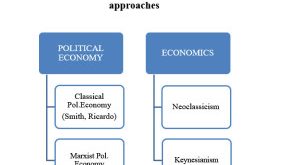The US is currently enjoying another stock market boom which, if history is any guide, also stands to end in a bust. In the meantime, the boom is having a politically toxic effect by lending support to Donald Trump and obscuring the case for reversing the neoliberal economic paradigm. For four decades the US economy […]
Read More »Top 10 Most-read Economic Sociology and Political Economy Posts of 2019 — Oleg Komlik
As 2019 (already) comes to an end, I rounded up the top 10 most-read posts of the year on the Economic Sociology and Political Economy community blog. You are welcome to (re)read and share them. And, let’s try something new, this list are followed by the 10 least-read posts of the year which are surely worth reading.... Economic Sociology and Political EconomyTop 10 Most-read Economic Sociology and Political Economy Posts of 2019Oleg Komlik | founder and editor-in-chief of the ES/PE,...
Read More »The economics of negative interest rates: editors’ introduction
Thomas Palley, Louis-Philippe Rochon, Guillaume Vallet , Review of Keynesian Economics, April 2019. The Great Recession (2008/9) triggered by the financial crisis of 2008 has had considerable impact on the conduct of monetary policy. Before the recession, monetary policy was largely based on a New Consensus-type macroeconomic model and it targeted inflation via a Taylor […]
Read More »Michael Roberts Blog — Economics as a social science
There is no substitute for the ‘big picture’. Economists should not be doctors but social scientists, or more accurately they should develop an economics that recognises the wider social forces that drive economic models, in particular, the social mode of production that is capitalism. That is political economy, mostly not taught in universities and certainly not practised in international agencies.... Michael Roberts Blog — blogging from a marxist economistEconomics as a social...
Read More »Bill Mitchell – billy blog Q&A Japan style – Part 1 through 4 of 4
Bill's 4 part series on Japan.Bill Mitchell – billy blogQ&A Japan style – Part 1Q&A Japan style – Part 2Q&A Japan style – Part 3Some reflections on my time in Japan while I am too busy to writeQ&A Japan style – Part 4 Bill Mitchell | Professor in Economics and Director of the Centre of Full Employment and Equity (CofFEE), at University of Newcastle, NSW, Australia
Read More »Shoring up capitalism — Chris Dillow
This is a good analysis of the political economy of capitalism in general and as it applies specifically to the UK now. The links are important in developing the nuance.Stumbling and MumblingShoring up capitalismChris Dillow | Investors Chronicle
Read More »Bill Mitchell — Is the British Labour Party aboard the fiscal dominance train – Part 1?
As I type this (Sunday), I am heading to Brighton, England from Edinburgh. We had two sessions in Edinburgh yesterday (Saturday) and it was great to share ideas with some really committed people. We had to dodge a Hollywood closure of the streets (‘Fast and Furious 9 had commandeered the inner city to film a car or two swerving out of control or whatever, and I hope the city received heaps for the inconvenience to its citizens. But, with the direction now south, and tomorrow’s two events...
Read More »‘Economic Crisis and the crisis of Economics: Political Economy as a realistic and credible alternative’ – video lecture by S.Mavroudeas
I have been invited by the ISEPA’19 conference (organised by the Dicle University) to speak atheir conference. Since I could not make it due to other obligations I was asked for a video lecture. Its subject is ‘Economic Crisis and the crisis of Economics: Political Economy as a realistic and credible alternative’ Nikos Zappas did an excellent job in recording and editing the video. The link for watching the video is below: [embedded content] The abstract of the lecture is the...
Read More »Thomas Piketty’s New Book — Ramanan
Piketty coins a new term, the "Brahmin left."The Case for Concerted ActionThomas Piketty’s New BookV. Ramanan
Read More »Central Bank Independence: A Rigged Debate Based on False Politics and Economics
The case for central bank independence is built on an intellectual two-step. Step one argues there is a problem of inflation prone government. Step two argues independence is the solution to that problem. This paper challenges that case and shows it is based on false politics and economics. The paper argues central bank independence is […]
Read More » Heterodox
Heterodox

